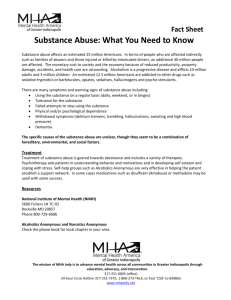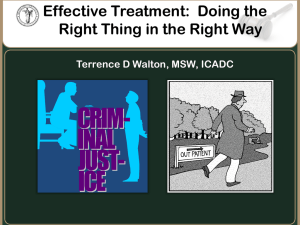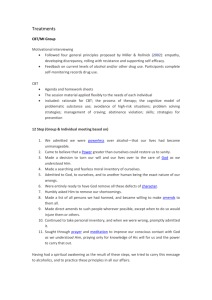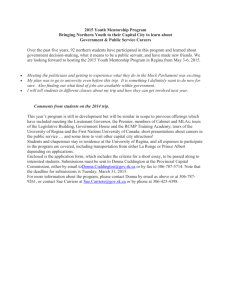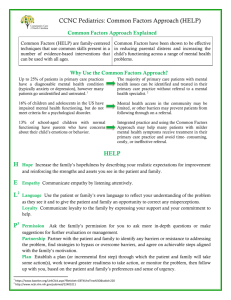June 2015 - Alcoholics Anonymous Regina
advertisement
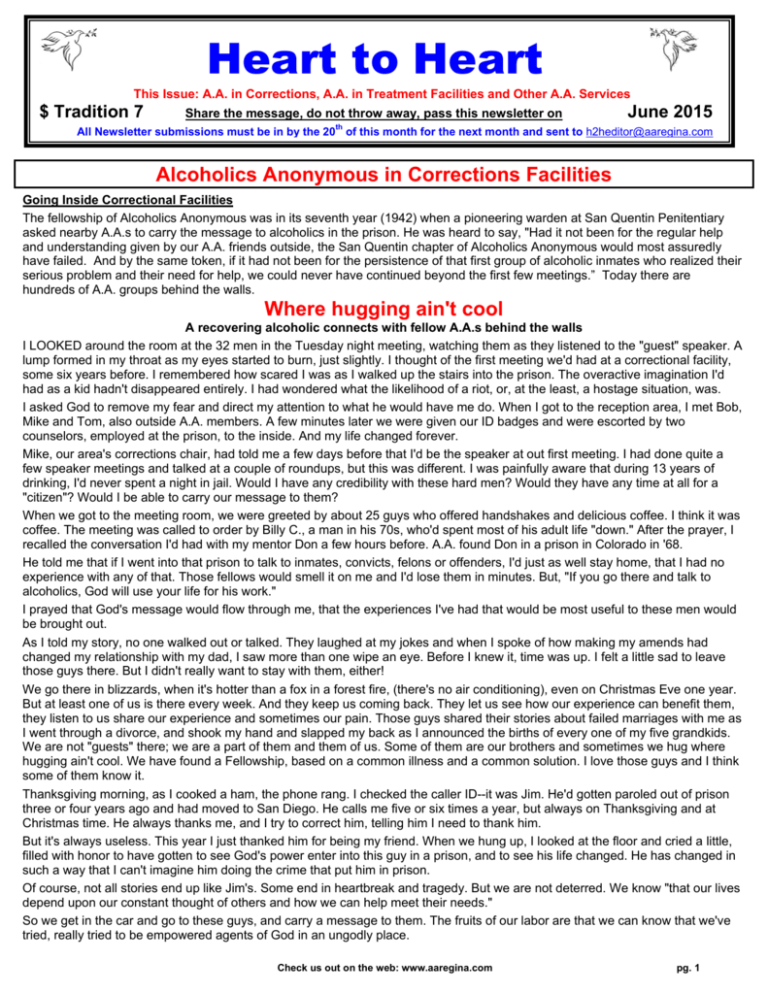
Heart to Heart This Issue: A.A. in Corrections, A.A. in Treatment Facilities and Other A.A. Services $ Tradition 7 Share the message, do not throw away, pass this newsletter on June 2015 th All Newsletter submissions must be in by the 20 of this month for the next month and sent to h2heditor@aaregina.com Alcoholics Anonymous in Corrections Facilities Going Inside Correctional Facilities The fellowship of Alcoholics Anonymous was in its seventh year (1942) when a pioneering warden at San Quentin Penitentiary asked nearby A.A.s to carry the message to alcoholics in the prison. He was heard to say, "Had it not been for the regular help and understanding given by our A.A. friends outside, the San Quentin chapter of Alcoholics Anonymous would most assuredly have failed. And by the same token, if it had not been for the persistence of that first group of alcoholic inmates who realized their serious problem and their need for help, we could never have continued beyond the first few meetings.” Today there are hundreds of A.A. groups behind the walls. Where hugging ain't cool A recovering alcoholic connects with fellow A.A.s behind the walls I LOOKED around the room at the 32 men in the Tuesday night meeting, watching them as they listened to the "guest" speaker. A lump formed in my throat as my eyes started to burn, just slightly. I thought of the first meeting we'd had at a correctional facility, some six years before. I remembered how scared I was as I walked up the stairs into the prison. The overactive imagination I'd had as a kid hadn't disappeared entirely. I had wondered what the likelihood of a riot, or, at the least, a hostage situation, was. I asked God to remove my fear and direct my attention to what he would have me do. When I got to the reception area, I met Bob, Mike and Tom, also outside A.A. members. A few minutes later we were given our ID badges and were escorted by two counselors, employed at the prison, to the inside. And my life changed forever. Mike, our area's corrections chair, had told me a few days before that I'd be the speaker at out first meeting. I had done quite a few speaker meetings and talked at a couple of roundups, but this was different. I was painfully aware that during 13 years of drinking, I'd never spent a night in jail. Would I have any credibility with these hard men? Would they have any time at all for a "citizen"? Would I be able to carry our message to them? When we got to the meeting room, we were greeted by about 25 guys who offered handshakes and delicious coffee. I think it was coffee. The meeting was called to order by Billy C., a man in his 70s, who'd spent most of his adult life "down." After the prayer, I recalled the conversation I'd had with my mentor Don a few hours before. A.A. found Don in a prison in Colorado in '68. He told me that if I went into that prison to talk to inmates, convicts, felons or offenders, I'd just as well stay home, that I had no experience with any of that. Those fellows would smell it on me and I'd lose them in minutes. But, "If you go there and talk to alcoholics, God will use your life for his work." I prayed that God's message would flow through me, that the experiences I've had that would be most useful to these men would be brought out. As I told my story, no one walked out or talked. They laughed at my jokes and when I spoke of how making my amends had changed my relationship with my dad, I saw more than one wipe an eye. Before I knew it, time was up. I felt a little sad to leave those guys there. But I didn't really want to stay with them, either! We go there in blizzards, when it's hotter than a fox in a forest fire, (there's no air conditioning), even on Christmas Eve one year. But at least one of us is there every week. And they keep us coming back. They let us see how our experience can benefit them, they listen to us share our experience and sometimes our pain. Those guys shared their stories about failed marriages with me as I went through a divorce, and shook my hand and slapped my back as I announced the births of every one of my five grandkids. We are not "guests" there; we are a part of them and them of us. Some of them are our brothers and sometimes we hug where hugging ain't cool. We have found a Fellowship, based on a common illness and a common solution. I love those guys and I think some of them know it. Thanksgiving morning, as I cooked a ham, the phone rang. I checked the caller ID--it was Jim. He'd gotten paroled out of prison three or four years ago and had moved to San Diego. He calls me five or six times a year, but always on Thanksgiving and at Christmas time. He always thanks me, and I try to correct him, telling him I need to thank him. But it's always useless. This year I just thanked him for being my friend. When we hung up, I looked at the floor and cried a little, filled with honor to have gotten to see God's power enter into this guy in a prison, and to see his life changed. He has changed in such a way that I can't imagine him doing the crime that put him in prison. Of course, not all stories end up like Jim's. Some end in heartbreak and tragedy. But we are not deterred. We know "that our lives depend upon our constant thought of others and how we can help meet their needs." So we get in the car and go to these guys, and carry a message to them. The fruits of our labor are that we can know that we've tried, really tried to be empowered agents of God in an ungodly place. Check us out on the web: www.aaregina.com pg. 1 As I looked around that room on Tuesday, I realized I haven't been scared in there for a long, long time; in fact, not since that first meeting years ago. Another Promise had come true. I can go to the "most sordid spot on earth," and keep unharmed. Thank you A.A. for giving me a reason to get away from my TV and share my life with guys just like me. Anonymous, Grapevine Archive The Correctional Facilities Coordinator for Regina and Area A.A. Intergroup is responsible for dealing directly with staff and personnel of correction facilities and supplying Chairpersons, Speakers, and Literature for A.A. Meetings at correctional centers, jails, detention centers, probation centers and similar institutions in Regina and surrounding area. To become a Correctional Volunteer requires minimum continuous sobriety of one to two years. Because we are entering highly restricted areas, there are application forms to be completed and submitted to the facility where the individual would like to carry the message of recovery to our members on the inside. A government background check is completed. When all this has been completed, an identification tag with a recent photo on it is provided. By now a fairly good idea of the type of commitment needed is clear. For example, how many times a month one can be available to put on a meeting on the inside. It is suggested that our newly cleared members consider a minimum of once a month and commitment for one year. If you are interested in helping to carry the message in Correction facilities, please contact a.a@sasktel.net Alcoholics Anonymous in Treatment Facilities First Impressions Ways that A.A.s reach those in Treatment Treatment facilities hold a special place in my heart," says Mike M. of Queens, New York. "I can speak only for myself, but I was in rehab three times. It helped me by getting me off the street and detoxing in a facility." Going away to treatment provided "a separation from alcohol in a controlled environment," says Trei J. of Montgomery, Alabama. He says he also received the medical attention he needed. Mike is former Treatment Committee chair and current District Committee Member Chair for Queens County, part of Area 49, New York. Trei serves as Treatment Facilities Chair for Area 1, Alabama/North West Florida. Both have spent several years doing A.A. service in treatment facilities, getting the message of A.A. to the patients so that they have support after they're discharged. The Bridging the Gap program helps get new A.A.s to their first meeting. A.A.s who volunteer for this commitment either pick patients up at discharge, meet them at a meeting, or introduce them to other A.A.s, Mike says. In Area 1, Trei reports, all but one of the twenty-four districts now have a Bridging the Gap representative. "It makes it so worthwhile when you bring someone to a meeting and, a month or a year later, you see them at a meeting and they are still sober," Mike says. Treatment committees also bring A.A. meetings into facilities, Trei says. His area coordinates a speaker meeting at a rehab and several meetings a week at a detox including a "presentation" meeting, where A.A.s show the video "HOPE: Alcoholics Anonymous" (see resources box) and several speakers share their experience with the first three Steps. A.A.'s General Service Office (GSO) in New York City acts as a liaison to treatment facilities committees, Bridging the Gap committees, and hospitals and institutions committees. Warren S., GSO's Treatment Facilities Coordinator, says that treatment center professionals (and sometimes patients) contact the GSO, requesting literature or a contact when a patient is about to be released. GSO maintains a list of all treatment facilities committee chairs in the United States and Canada, so Warren directs the professional to the local committee chair. Bridging the Gap is similar to the program with the same name for corrections, but a stay in treatment is usually shorter than a corrections term, Warren says. "There's always a need for volunteers." Some A.A. groups sponsor a treatment facility meeting. Some facility meetings are not listed in an area's meeting directory and are closed to the general public. Although occasionally, meetings are run by the treatment professionals, experience suggests that it's best when they are conducted by outside A.A. members, Warren says. If a counselor is also an A.A. member, he has to keep his professional work and his Twelfth Step work separate. "He has to find a way to make it clear that the treatment facility is one thing and A.A. is another thing." Treatment facility committee chairs may team up with cooperation with the professional community committee chairs to discuss how A.A. can be a resource, as well as what A.A. does and doesn't do, Warren says. The amount of time it takes a person to attend his or her first A.A. meeting upon release can be a factor in whether a patient maintains sobriety after treatment. "Unless they are sick and tired and I mean real sick and tired of being sick and tired and the people bringing in the A.A. meeting have made an impression, it's not likely to occur," Warren says. The purpose of Treatment Facilities Coordinator for Regina and Area A.A. Intergroup is to assist members to carry the message of Alcoholics Anonymous to Treatment Facilities and outpatient settings in Regina and surrounding area. In addition to bringing the message of hope for recovery, to alcoholics in a variety of treatment settings, the Treatment Facilities Coordinator demonstrates Check us out on the web: www.aaregina.com pg. 2 to administrators and staff "how it works" and are instruments of attraction to the A.A. program and provides information about A.A. as well as literature and guidelines for setting up A.A. meetings in treatment facilitates and outpatient settings. Treatment settings may include: treatment facilities, hospitals, psychiatric wards, nursing homes, youth non-correctional facilities, shelters, halfway houses, veteran facilities, senior centers, etc. The Treatment Coordinator maintains a list of members who are willing to extend the hand of A.A. to those released to their community after completion of a treatment facility program. If you are interested in helping to carry the message in Treatment Facilities, please contact a.a@sasktel.net Other Alcoholics Anonymous Services Bridging the Gap The Bridging the Gap program matches up someone new to A.A. who is leaving a treatment, correctional, hospital or detox facility with a temporary contact person. As a temporary contact person you may take the newcomer to a variety of A.A. meetings; introduce him or her to other A.A.s; ensure that he or she has the phone numbers of several A.A. members, and share the experience of sponsorship and a home group. One of the more “slippery” places in the journey to sobriety is between the door of the facility and the nearest A.A. group or meeting. In order to bridge the gap, A.A. members have volunteered to be temporary contacts and introduce newcomers to Alcoholics Anonymous. For more information take a look at the Bridging the Gap pamphlet at www.aa.org If you are interested in participating in the Saskatchewan Bridging the Gap program, please contact btg@aasask.org Corrections Correspondence Service – A special kind of A.A. service The corrections correspondence Service (CCS) connects A.A.s on the inside with A.A.s on the outside. GSO has a waiting list of male A.A. members in prison who requested the CCS and are waiting for an outside A.A. member to write to them. A.A.s available to share, through correspondence, their experience, strength, and hope in Alcoholics Anonymous should contact corrections@aa.org The “Pink Can” The Pink Can idea seemed to have originated in the Northern California Area in 1957. The purpose was to provide sufficient funds to purchase literature for expanding work in prisons. Individual contributions, although quite helpful, were not enough to keep up with the expanding responsibilities of the local Hospitals & Institutions Committees. Someone came up with the idea of passing a can during meetings and requesting spare change. It was explained that all monies collected would be used to buy literature for alcoholics in hospitals and prisons. In order to make the can “stand out,” a decision was made to paint the can pink. In a short time, pink cans started appearing on literature tables and were being passed around at various meetings. Does your group contribute to the “pink can”? Funds from "pink cans", earmarked for conference-approved literature, are sent to the Area Treasurer. Applications for literature funds are made to the Area Corrections Coordinator. If you have questions or are interested in participating in the “pink can”, please contact corrections@aa.org ANNOUNCEMENT: The Women’s BYOB Group has two of the roller blinds with the 12 Steps and 12 Traditions on them. If your group is interested in them, please email a.a@sasktel.net I say the Serenity Prayer daily on the way to work, but I say it like this: "God, grant me the Serenity to accept those people, places and things I cannot change, the courage to change those things about myself that I can, and the wisdom to know the difference." Accept others---change myself: it's hard to do but at least I know what has to be done. Robert T. The topic for the July edition of the Heart to Heart will be Tradition 7. If you have anything you would like to submit, please email h2h@aaregina.com A friend of mine once said, "When I end the day with unfinished business, I ended up dragging it into the next day with me. And I can't live one day at a time until I've dealt with yesterday." When I remember to take a quick inventory and share it with another alcoholic, I can see my unfinished business. When I'm in the present, there's no fear, anxiety, resentment, regret because those things generated by dwelling on the past or the future. In the present, there is only action that needs to be taken---or acceptance of the way things are. Todd C. Don’t Miss 12 Steps to Recovery Group – Annual Cook Out August 22nd @ Regina Wildlife Federation Speaker to be announced - Watch for more information Check us out on the web: www.aaregina.com pg. 3 Special Events, Celebrations, Notices Happy Birthday To those celebrating milestones of sobriety … those 24hrs add up! 525 Rolling Home Group Jamie P. May 26th 2 Yrs Lori L. May 30th 10 Yrs* th Norm D. May 30 16 Yrs *Open celebration held June 1st at 5:25pm Healing Hands Group Valerie H. Aug 18th 40 Yrs* *Open celebration held August 19th @ 7:30pm Harmony Group Kelly B. June 1st 1 Yr Jane F. June 3rd 21 Yrs th Dean P. June 9 7 Yrs Scott P. June 11th 31 Yrs Don H. June 16th 1 Yr Lumsden Group Jack H. 50 Yrs* Stan T. 21 Yrs* Rhonda B. 1 Yr* Dave M. 40 Yrs* Debbie A. 9 Yrs* Vivian D. 1 Yr* *Open celebration held June 25th @ 7:30pm at Centennial Hall Don’t forget to email your Group’s Birthdays into h2heditor@aaregina.com before the 20th. We will publish the month prior if missed in the previous issue. Regina & Area A.A. Intergroup Intergroup Service Meetings: Central Office Committee Meeting - Monday prior to First Wednesday of the month @ 7:30pm, Central Office, 107-845 Broad St. Contributions to Intergroup What’s Happening in Regina The Conference-approved pamphlet: “Self-Support: Where Money and Spirituality Mix” For posters go to: www.aaregina.com Offers the following suggestions for the distribution of group funds after group expenses have been paid: 50% Regina Intergroup 30% General Service Office 10% Area 91 10% District Committee Because of the reporting structure and printing of the Heart to Heart this list will always be printed two months after they are received. CORRECTION: Thank you to the following for their contributions to Intergroup in April 2015: Nu-Life Group, Novalco Group and District 17. Area 91 / Districts 15, 17 & 18 News For more info go to www.aasask.org Districts 15,17 & 18 monthly meetings: 2nd Wednesday of the month @ 7:30pm Mount Olive Lutheran Church, 2015 4th Ave. N. All members are welcome and encouraged to attend and get involved. Upcoming District events for 2015 Gratitude Night – November 7, 2015 Upcoming Area Events for 2015 Fall Assembly - Oct 16 - 18, 2015, North Battleford Christopher Lake to host the ACM - Jan 2016 Saskatoon to host the Spring Assembly – Mar 2016 Regina to host the Fall Assembly – Oct 2016 Intergroup Committee Meeting - 1st Wednesday of the month @ 7:30pm, YWCA, 1940 McIntyre St. All members are welcome and encouraged to attend and get involved. Vacant Positions: • Treatment Facilities Co-ordinator (Trustee) • Information Committee Chair Committees to volunteer for: • Alcathon Committee • Regina Round Up Committee • Social Events Committee • Speaker Meeting Committee is currently looking for volunteers, please contact Central office Free Subscription The Heart to Heart by e-mail For your free monthly subscription, send an email with “Free Heart to Heart” in the subject line to: h2heditor@aaregina.com The Heart to Heart by e-mail is in PDF format and requires Adobe Reader software. Free download available at www.adobe.com Grapevine Subscription Challenge Let’s show them what Saskatchewan can do! For more information go to: http://www.aagrapevin e.org/grapevinechallenge Central Office #107– 845 Broad Street, Broad Street Business Centre Office Hours: Monday, Wednesday & Friday 12:00pm. – 5.00pm - Closed Statutory Holidays 24-Hour Answering Service : 306-545-9300 E-mail:a.a@sasktel.net Note from your Newsletter Editor: I would love to hear from YOU . . . what would you like to see in the newsletter, do you have comments/suggestions? Or perhaps you have a story to submit. Please email me at h2heditor@aaregina.com • • • Literature 75th Anniversary Edition Big Books - $15.00 Grapevine Daily Quote Books - $14.00 A Brief History of AA - $1.50 For a current list of literature and prices go to www.aaregina.com/aa_literature.html You can pick up all literature from Central Office. Watch for the next Intergroup Social Committee Open Event ES&H - Open Speaker Meeting June 6, 2015 Speakers: Barb M. (Friday Eureka Luncheon Group) Ron W. (Saturday @ 9 Group) Fellowship 7:00pm, Speaker Meeting 7:30pm 1165 Pasqua Street Celebrating 80 Years of Recovery, Unity & Service Districts 15, 17 & 18 th Saturday, June 13 - 11:00am – 1:00pm Tickets only $5 *If you would like to help out in any way, please let your GSR know or contact your DCM. Meeting News Updates/Changes/Deletions Northgate Group (Friday’s @ 9pm) Effective Apr 1st meets at the Northeast Community Centre, 160 Broad Street 12 Steps to Recovery Group (Monday’s @ 8pm) Effective Apr 1st mteets at the Northeast Community Centre, 160 Broad Street Meetings needing member support Contact Central Office at 545-9300 The Liver and Onions Group Meets Thursdays @ 7:30pm in the Cafeteria room 4 at the General Hospital Pine Lodge Treatment Centre Contact - Jim W. Regina Correctional Centre Meets Tuesdays or Wednesdays @ 7:00pm Clearance Required - Contact Jim W . Women’s Correctional Meeting White Birch Group Meets Wednesdays @ 7:30pm Women's Remand Centre, Paul Dojack Youth Centre, Clearance Required - Contact Linda K. Out of town Round Ups International Events For more information go to: www.aa.org 2015 International Convention, July 2-5, 2015 - Atlanta, Georgia 2020 International Convention July 2 – 5, 2020, Detroit, MI 2025 International Convention July 2 – 5, 2025, Vancouver, BC Condolences On behalf of our members, our sincere condolences to out to any members who are grieving the loss of a loved one. Our prayers and thoughts are with you. Check us out on the web: www.aaregina.com For more info go to www.aasask.org Cypress Hills AA and Al-Anon Round Up June 6, 2015 White Bear Last Stand Group Annual Gratitude Day June 13, 2015 Coronach Pioneer Group 38th AA/Al-Anon Camp Out June 19-21, 2015 Marean Lake Camp Out Round Up June 19-21, 2015 Heart to Heart is the newsletter voice of Regina area A.A.. Regina Intergroup as a service to the A.A. community publishes it. It uses the basic intent of the A.A. Grapevine policy and mission statement as its editorial policy. Its intent is to enhance an already strong recovery community by providing a vehicle for sharing the combined recovery messages and our experiences, strengths and hopes. You and your group can contribute to its financial survival through your group and taxdeductible donations to Regina A.A. Intergroup Office. Any of the articles in this publication are the opinion of the writers and do not necessarily reflect official A.A. position. pg. 4
